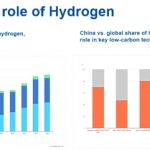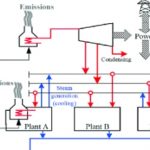Every efficiency gain discovered in the lab feeds through to the final cost of electricity. Anne Trafton at MIT describes new research looking at how electrons and protons couple at an electrode surface, which drives electric current. It’s a critical step in many energy technologies, including fuel cells, hydrogen electrolysers, batteries, and CO2 conversion into chemical fuels. The first step was to develop a way to design electrode surfaces … [Read more...]
Fuel Cells and Electrolysis: nanoparticle catalyst electrodes can advance clean power and Hydrogen production
Fuel and electrolysis cells both involve electrochemical reactions (one is the reverse of the other), and their efficiency depends on the catalysts used on the electrodes. Conventional metal catalysts coarsen at high temperatures, reducing activity and durability. Elizabeth Thomson at MIT describes new research there that uses ion irradiation to precipitating metal nanoparticles onto the surface of the electrode. The process allows close control … [Read more...]
Making solid fuel from captured CO2 (with a 96% conversion rate)
What if CO2 could be captured and, rather than locked away underground for eternity, turned into a stable powder that can be used in fuel cells to produce electricity? David Chandler at MIT describes research there and at Harvard that has demonstrated a new process that has a 96% conversion rate. It’s been tried before, but the conversion rates were an unusable 20%. The CO2 is converted into formate and used like hydrogen or methanol (both strong … [Read more...]
Making Fuel Cells cheap enough for mainstream use: can Cobalt nanoparticles replace Platinum as catalysts?
Fuel cells could be a game-changer in decarbonisation. They efficiently convert chemical energy into electricity with only water and heat as byproducts. One of the most promising types is the PEMFC (polymer electrolyte membrane fuel cell) because of its applications in transportation, as well as stationary power sources. But it can’t go mainstream until the costs come down, specifically the platinum catalysts. Platinum is scarce and expensive. … [Read more...]
4 CEOs explain their innovations: EV charging, aviation fuel, hydrogen fuel cells, nuclear waste-to-energy
To meet our global climate targets, new solutions, technologies and pathways will be needed. Existing technologies, on their own, can’t be scaled up fast enough to do it. Robin Pomeroy and Kate Whiting at the World Economic Forum pick out highlights from their podcast that hears from four CEOs of innovative companies, covering EV charging, aviation, hydrogen fuel cells, and new nuclear. Today’s millions of EV charging points needs to rise to 450m … [Read more...]
‘Green Deal Industrial Plan’ explainer: 40%+ of the top low-carbon technologies must be made in the EU by 2030
The EC’s new series of proposed targets and reforms, contained in its Green Deal Industrial Plan, aim to ensure that at least 40% of the EU’s low-carbon technologies will be made within its borders by 2030. The eight “strategic net-zero technologies” are: Solar (power and thermal); Onshore and offshore wind; Batteries and energy storage; Heat pumps and geothermal; Electrolysers and fuel cells; Sustainable biogas/biomethane; CCS; Grid … [Read more...]
Getting Concentrated Solar Power (CSP) down to $0.05 per kWh
The U.S. Department of Energy is funding research to get the cost of Concentrated Solar Power (CSP) down to $0.05 per kWh. One key element of that research is the materials used to absorb and store the heat energy. Three categories of materials are being looked at: liquid (i.e. molten salt), particle (like sand), and gaseous. NREL is leading the molten salt research, and there are multiple challenges. The salts can corrode the storage tanks and … [Read more...]
Clean Hydrogen from water electrolysis: research into catalysts to meet global targets
The full potential of the new hydrogen economy will depend on producing enough clean hydrogen from water electrolysis which uses precious metals. But, as Glennda Chui at SLAC (Stanford University & DoE) explains, there aren’t enough precious metals in the world to get to the scale we need. And their cost is so high the clean hydrogen they generate could never compete with hydrogen derived from fossil fuels. Over 95% of hydrogen produced today … [Read more...]
Clean Trucks are coming: a review of battery, hydrogen, synthetic fuels and more
New EU fuel efficiency rules are forcing truck makers into a race to get their low emission vehicles onto the roads. From 2025, newly registered trucks must have 15% lower emissions, and from 2030 it’s 30%. Battery-electric drivetrains are most likely to dominate, assisted in their evolution by the assured progress and charging infrastructure of EVs. Hydrogen fuel cells and synthetic fuels are also in the game, though hindered by the inevitable … [Read more...]
How can Europe help build China’s Hydrogen economy?
On 18th November Energy Post, in partnership with the EU-China Energy Cooperation Platform, hosted a series of online workshops under the theme “China: Carbon Neutral by 2060”. The purpose was to understand the Chinese landscape and uncover opportunities for Europe. Here, the moderator for our “Hydrogen” panel, Gökçe Mete, summarises the workshop which included an expert panel discussion and questions from the audience. Taking part were Tudor … [Read more...]
Hydrogen’s future: reducing costs, finding markets
Although 100Mt/year of hydrogen is produced globally and at scale, it’s overwhelmingly for the chemical industry. So there’s a long way to go for it to play a role in the energy transition. It’s not even clear whether hydrogen will be best used directly as a power source or through further conversion into other powerfuels. That's why Dolf Gielen and Emanuele Taibi at IRENA are scoping out the challenges of reducing production costs and finding … [Read more...]
Decarbonising industry: how much policy-driven adoption is needed to let the market take over
Decarbonising industry is one of the world’s greatest challenges. The costs, today, are huge and therefore the technology adoption required has hardly started. But several technologies already exist. Gbemi Oluleye at Imperial College (UK) explains the first step is to measure the market size for each sub-sector, then estimate how much policy-driven adoption is required to achieve the cost reductions that make the change viable. After that, no … [Read more...]













